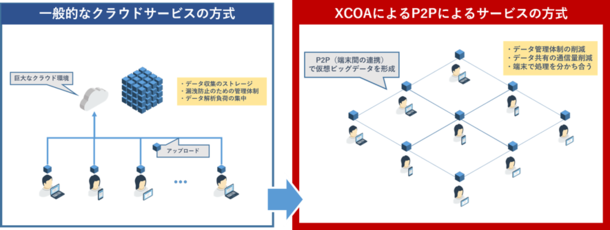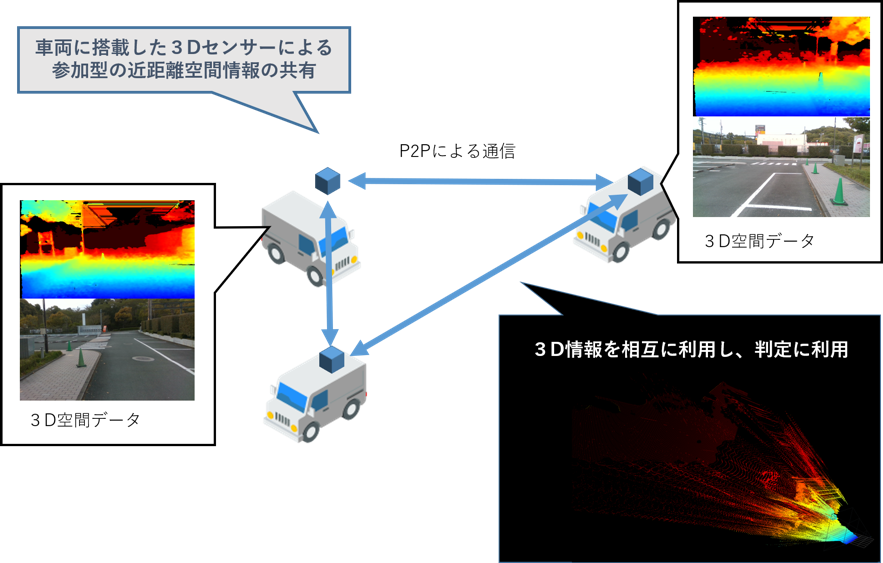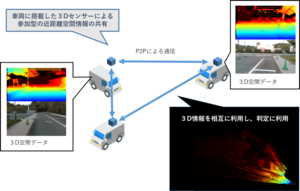TRIART Inc. (located in Iizuka City, Fukuoka Prefecture, CEO: Kentaro Imazu, hereinafter TRIART)in big data operations involving the collection and analysis of large volumes of data and handling numerous users with highly confidential data, has realized a technology that utilizes TRIART’s XCOA (Cross Core) technology to ensure data security while analyzing massive datasets. This paves the way for the realization of terminal-linked virtual big data and its computational processing. Moving forward, TRIART plans to further demonstrate this new technology, deploying it in fields that handle large volumes of confidential and personal information, such as the healthcare and financial industries that require high security, as well as in areas like automotive manufacturing and construction where large-scale and high-speed data processing is essential for industrial IoT.

【Reference Material 1: From big data collected and managed in the cloud, to mutual data use through secure P2P terminal linkage】
In general Internet services such as Web services, handling of data usually involves collecting users’ contract information, personal information, and activity logs on cloud servers under the trust of the operating organization, and managing and operating them based on rules. Service providers can gain insights into overall trends and new discoveries by analyzing the collected data through statistical processing or AI. However, because this information is handled based on trust, there remains a risk of human error leading to data leaks or tampering. Strict management is challenging, and maintaining data services and overseeing operations is difficult.
Additionally, there are limitations to connection speeds and CPU processing capabilities with cloud services. Processing data involving risks, such as electronic money transactions or autonomous driving, requires both importance and real-time capability. Clouds capable of the large-scale processing necessary for such operations are very expensive, and there are issues with implementing service systems in environments like developing countries where infrastructure is not well developed. Therefore, although services without a central system that utilize blockchain have seen explosive growth in recent years, they are not necessarily suited for handling large amounts of data.
In response to these challenges, TRIART has developed a big data processing technology utilizing P2P that does not aggregate data from each user’s device on a server but rather distributes the data across devices and collaborates through software. This virtually combines each user’s device as part of the data to form big data. Furthermore, by using the CPU of each user’s device to distribute the processing, it enables participatory large-scale computational processing, allowing for the execution of massive analytical calculations. This allows for the construction of a low-cost, high-performance data processing infrastructure through software (Reference Material 1).
To effectively utilize this system, TRIART has successfully developed a program for secure, serverless utilization of massive data by consolidating inter-device P2P collaboration, through research in computer collaboration technology (Cross-Computing Architecture: XCOA), merging secure data encryption technology and P2P network formation technology, while maintaining safe security measures.
Depending on the type of data collected, in the medical field for example, traditional vital data collection required more than 1G of data size per day. If data for 100 people were sent to a server, it would necessitate about 100G of communication processing on the receiver’s end. In contrast, the technology developed now eliminates the need for data collection time through communication, offering potential for time savings and cost reduction in processes requiring immediacy. Furthermore, by eliminating the need for aggregate calculations after data collection, it enables improved processing speeds and the realization of real-time services compared to traditional aggregated big data formation methods.
As a practical demonstration, by organizing a data network via P2P without aggregating spatial information from multiple cameras and sensors on a server and collaborating on processing, we were able to perform risk assessment processing in participatory specific spaces without collecting data (Reference Material 2). Moreover, it enabled the management of medical information and testing data without aggregation and facilitated the use and processing of personal information without storing the data.

【Reference Material 2: Spatial risk management through mutual use of 3D data between vehicles】
■Benefits of This Technology
(1)Analysis utilizing confidential information such as DNA and vital data that one does not wish to leak, and processing of large-scale data and imagery
(2)No need to construct massive servers or network infrastructure, even as the number of devices and volume of data increase
(3)Reduction in storage and communication costs related to the operation of IoT and confidential information data
(4)Large-scale analysis, previously impossible, is made possible by combining the CPU processing capabilities of devices
(5)It is possible to construct an infrastructure that ensures strong security and prevents information leakage with just the implementation of software.
With the spread of blockchain, decentralized ledger technology and networks that allow devices to share information with each other without relying on servers through P2P communication have attracted attention. This system becomes one of the applied technologies that implement these technologies into the real world. This technology is expected to be applicable across multiple industries, including the medical and financial sectors.
【About TRIART Inc.】 ( https://triart.co.jp/en/ )
TRIART is a technology-creation IT company primarily engaged in the research and development of new technologies using IT, as well as consulting. It has numerous proprietary technologies such as data processing with artificial intelligence, image application processing technology, and network security technology. It has provided many network and information security solutions, solving numerous complex issues in the market. In particular, its research and development capabilities in security technologies, including the cryptographic data distribution technology “XCOA” (Cross Core), have been highly regarded. It has developed solutions for the medical field, such as the reliable remote medical diagnostic support system “XMIX”, and has been involved in information security for major corporations.
<TRIART Inc. Company Overview>
CEO: Kentaro Imazu
Company Location: 680-41 CIRD, Kawazu, Iizuka City, Fukuoka Prefecture, Japan
Established : January, 2003
Capital : 10 million yen
Business details : IT Solution Business / Information Design Business
URL : https://triart.co.jp/en/



